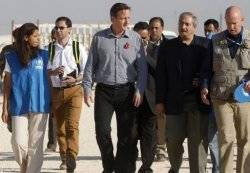Syrian President Bashar al-Assad's regime will not stay in power for much longer, Nabil el-Araby, the head of the Arab League, has said, urging the opposition meeting in the Gulf state of Qatar to put aside their differences.
"It is important to unify the opposition's visions, especially because everyone knows that the regime in Syria will not remain for long and one day there will be a new situation in Syria," he told reporters in Cairo on Wednesday.
El-Araby's comments came as the Syrian National Council's (SNC) general assembly of nearly 420 members meeting in the Qatari capital Doha moved to choose two leadership bodies and a president.
Attempts at new leadership have followed intense international pressure from critics who say the exile-dominated group needs to be overhauled as it does not represent the Syrian opposition on the ground.
Al Jazeera's Omar al-Saleh, reporting from the conference in Doha, said: "The electing process is ongoing. By Thursday morning there will be a new leadership, but the problems will remain huge as the SNC are seen to be weak."
Western pressure
The meeting took place as Western efforts to help rebels oust Assad have shifted dramatically, with Britain saying it will deal directly with rebel military leaders and Turkey saying NATO members have discussed protecting a safe zone inside Syria with Patriot missiles.
Britain announced it would begin direct talks with military figures in Syria's armed opposition groups, as Prime Minister David Cameron called for a new international approach to ending the conflict.
In a statement to parliament, William Hague, the foreign secretary, said Britain still would not supply weapons to the rebels and said officials would stress to the opposition groups the importance of respecting human rights.
Cameron himself toured a desert refugee camp for Syrians in northern Jordan on Wednesday.
"I am hearing appalling stories about what has happened inside Syria so one of the first things I want to talk to [US President] Barack [Obama] about is how we must do more to try and solve this crisis," he said.
In Ankara, a Turkish foreign ministry spokesman said Turkey was in talks with NATO about the possible deployment of Patriots, primarily used as anti-ballistic missiles, but Recep Tayyip Erdogan,Turkey's prime minister, said no request had yet been made.
Turkey has beefed up border security with tanks and anti-missile batteries in the face of the deadly conflict across the border, which has spilled over into each of Syria's neighbors.
Sectarian violence
Meanwhile, Syrian rebels shelled a key area of Damascus that is home to many members of Assad's Alawite minority, embassies and government buildings, as they stepped up attacks on his power base on Wednesday.
Sectarian divides are a key factor in Syria's armed rebellion, with many in the Sunni Muslim majority frustrated at more than 40 years of Alawite-dominated rule.
State news agency SANA reported that shells had hit a home and mini-bus carrying passengers in Mazzeh 86, which lies beneath Assad's hilltop presidential palace, killing at least three civilians.
The Syrian Observatory for Human Rights, a London-based watchdog that relies on a network of activists and medics on the ground, confirmed the shelling and said at least three civilians were killed and 12 wounded.
It previously reported a car bombing in an Alawite area of the suburb of Qudsaya on Tuesday that killed 19 people and another on Monday in Mazzeh that left 13 dead.
Fighting raged and air strikes were reported in other parts of the country, while SANA reported that a judge was killed when a car bomb exploded outside his home in the northeast of Damascus.
In the town of Nabak near Damascus, a suicide bomber drove a van loaded with explosives into an army position, killing six soldiers, the Observatory said, adding that at least 100 people had been killed across Syria on Wednesday.
It said more than 37,000 people had now died since the uprising against Assad's regime erupted in March 2011, first as a protest movement and then an armed rebellion after repression.
PHOTO CAPTION
British Prime Minister David Cameron (3rd L) visits the Zaatari refugee camp in the Jordanian town of Mafraq.
Aljazeera


 Home
Home Discover Islam
Discover Islam Quran Recitations
Quran Recitations Lectures
Lectures
 Fatwa
Fatwa Articles
Articles Fiqh
Fiqh E-Books
E-Books Boys & Girls
Boys & Girls  Ramadan
Ramadan Fatwa Audios
Fatwa Audios Month of Mercy
Month of Mercy Women
Women Eed Al- Fitr
Eed Al- Fitr Food Recipes
Food Recipes Videos
Videos

 Prayer Times
Prayer Times












